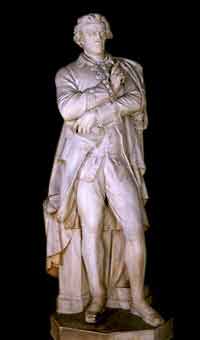Edmund Burke (1729-1797)
© 2007
Armchair Travel Co. Ltd. - This page may be used for non-commercial purposes
ONLY!
![]()

[ Play
Narrated and Animated Movie ! ] You could not stand five minutes with that man beneath a shed, while it rained, but you must be convinced you had been standing with the greatest man you had ever seen.
In his early years Edmund Burke briefly studied law before embarking on a literary career. He was extremely successful in this field and received considerable critical acclaim for his first two major works - Vindication of Natural Society (1756), and The Philosophical Inquiry into the Origin of Our Ideas on the Sublime and Beautiful (1756).
In 1761 Burke embarked upon his first political appointment as the private secretary to the British Chief Secretary for Ireland, and soon demonstrated his aptitude for the role. He went on to become Prime Minister Rockingham's private secretary, and was elected to Parliament in 1766. Burke's first seat was as the member for Wendover, and he subsequently sat for Bristol and Malton (Yorkshire).
Burke is noted as one of the greatest parliamentary orators, and was brilliantly skillful at debating. When Rockingham's government lost power, Burke became the leading speaker for the Whig opposition - 'The Rockingham Whigs' (opposition to Lord North's administration). For the twenty eight years that Burke was in Parliament it is said that he was one of the most frequent speakers. He also continued his writings, distributing pamphlets of important political speeches in printed form. His 'Thoughts on the Cause of the Present Discontents' 1770, was a declaration of the principles and philosophies of the Rockingham group.
Burke's main parliamentary concerns consisted of an attempt to repeal the Stamp Act, various famous speeches on the fight for justice and conciliation toward the American colonies, and a particular interest in India. Burke's chief activity in the 1780's was his investigation into, and attempts to stop the East India Co. exploiting the Indian population. This inquiry led to the impeachment and seven year trial of Warren Hastings - Governor General of Bengal. Burke opened proceedings in Westminster Hall, 1788, with a four day long speech.
Burke was one of the first European statesmen to fully comprehend the importance and possible consequences of the French Revolution. In 1790 he published 'Reflections on the Revolution in France' - his denunciation of the main political aspirations and objectives of the revolution. Burke retired from Parliament in June 1794.
The greater the power, the more dangerous the abuse.
He was so fond of arbitrary power that he could not sleep on his pillow unless he thought the king had a right to take it from under him.
[ Virtual
Tour ] [ Main Topics
Index ]
- Samuel Johnson, attributed to Mrs Piozzi.


Additional Information on
Edmund Burke (1729-1797)
QUOTATIONS
- Edmund Burke , speech in the House of Commons, 1771.
- Henry Grattan, in R.J. McHugh, Henry Grattan.
Explore-Parliament.net: Advanced Category Search
Keyword Categories:
_Object_Sculpture
_Object_Artwork
_Object_Portrait
_Artist_Theed
_Man
_Person
_Politician
_Burke